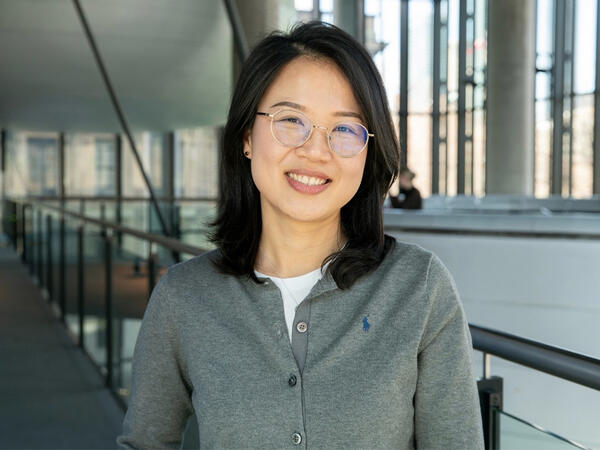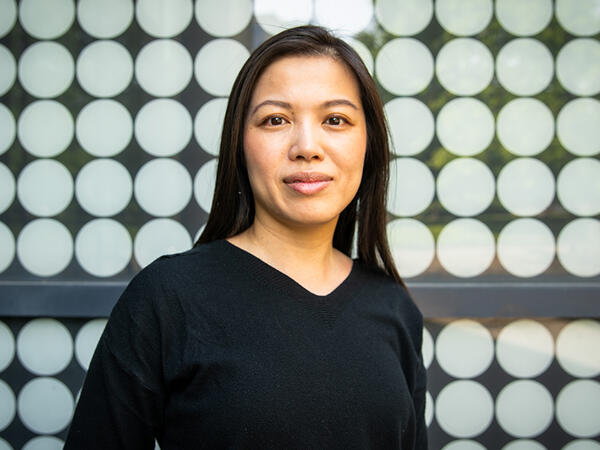Sameera Toenjes is a pharmacist and current Master of Science in Pharmaceutical Sciences student supervised by Lisa McCarthy, Associate Professor, Status at the Leslie Dan Faculty of Pharmacy and Clinician Scientist at Trillium Health Partners. Sameera also provides patient care in her clinical practice at Women’s College Hospital and works with the Bruyère Deprescribing Research Team. She is the 2021 recipient of the Clinical, Social & Administrative Pharmaceutical Sciences (CSAP) award and of the Metropolitan Toronto Pharmacists Association's James E.P. Rogers Memorial award, both of which are made possible by the support of donors.
The Office of Advancement and Alumni Relations spoke to Sameera about her innovative research and the impact both awards have had on her studies at the Faculty.
Why did you choose to pursue your studies at the Leslie Dan Faculty of Pharmacy?
I’m in the Clinical, Social & Administrative Pharmaceutical Sciences program at Leslie Dan Faculty of Pharmacy. While completing my PharmD program here at U of T, I was sitting in my Women’s Health class and while listening to our lecturer Dr. Lisa McCarthy talk, I realized I really wanted to work with her. I loved her teaching style, her style of storytelling, and her area of interest - medication-related harm. This area was super relevant to my practice experience, and when talking with her more about her research, I found her ability to translate her research into practice really exciting.
Can you tell us about your research at the Faculty?
For my thesis, I am applying qualitative research methods to better understand how to address prescribing cascades, an important and under-recognized contributor to medication-related harm. A prescribing cascade happens when someone takes a medication, experiences a side effect and that side effect gets treated with another medication. In practice, this often happens when prescribers attribute patients’ new signs or symptoms to a medical condition rather than a medication side effect. This can lead to problems like polypharmacy, which is associated with falls, hospitalizations, and other patient-related harms. As a pharmacist, I see prescribing cascades all the time in practice. It’s like a puzzle trying to sort them out and trace the origin. I wanted to contribute to research on how to prevent this problem in practice, and to investigate how we can better equip clinicians with the tools needed to do this.
What impact will your research project have on our society?
The aim of our project is to inform the development of practice guidance tool(s) for prescribing cascades in primary care teams, and by doing this, ultimately reduce medication-related harm. We are currently working with primary care clinicians to understand how to best design this tool.
You received both the CSAP award & the Metropolitan Toronto Pharmacists Association's James E.P. Rogers Memorial award. What impact will this funding have on your research and what would you say to the donors of these awards?
This funding has been instrumental in supporting my research and my stipend so we can run these focus groups and compensate participants. It has ultimately made graduate studies realistic for me by offsetting the cost of stepping away from full-time clinical care to do research. I want to say a huge thank you to the donors! I really appreciate your support in this research project. These donations make such a big difference for students so that we can explore new career directions and fully engage with our research interests.
What would you want current and prospective donors to know about the impact their support has had on your university experience?
Donor support has made my project and this experience possible. Our project is funded entirely by the support of donors. It’s enabled my team to get the resources, including time-saving analysis software, and people we need to make this all happen.
What are your goals for the future after graduation?
I’m really excited to take what I’ve learned from my supervisor and from this program to help integrate research into my daily practice as a pharmacist. So far, I’ve learned a lot about how to design a project so it can result in meaningful practice changes, the ins and outs of qualitative data collection and analysis, and the value of team-based research. It’s been an awesome experience, and I think the skills I’m learning will be really useful in my future practice.
Your donations help foster growth of the next generation of pharmacists and pharmaceutical scientists revolutionizing patient care across the world.
To support students like Sameera, please make a gift today:
More News
Image

Grad to Watch: Jackie Fule Liu’s research focuses on better outcomes for diabetes patients
A recent PhD graduate, Jackie Fule Liu combines hands-on skill and big-picture thinking to help tackle diabetes care challenges.
Read More
Image

U of T community members recognized with Order of Canada
Congratulations to Dean Emeritus and Professor K. Wayne Hindmarsh on his appointment.
Read More
Image

Welcoming Ivy Lam as Academic Lead in Climate, Health & Sustainable Care
Assistant Professor Lam will guide the Leslie Dan Faculty of Pharmacy's efforts to embed environmental sustainability across the Faculty.
Read More
